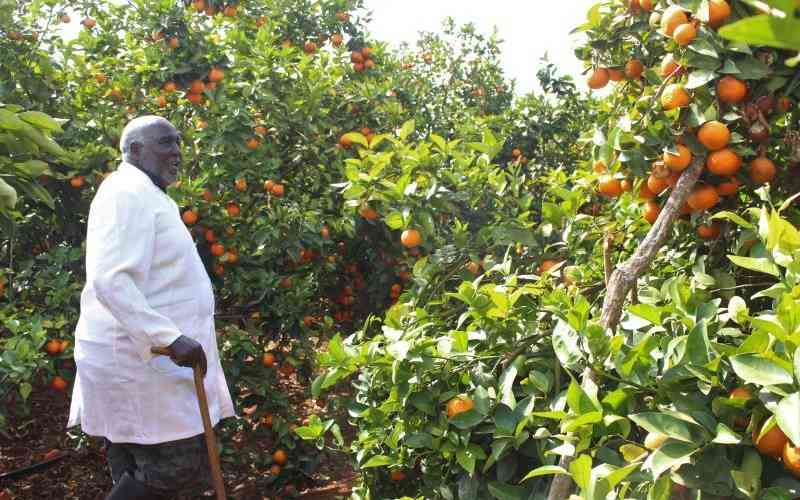
Pixie orange farming in Kenya is one form of agri-business that has picked up pace fast.
The fruit is a cross between oranges and tangerines, its yellow-orange in colour, seedless, easy to peel, tasty and highly nutritious.
Stephen Mutiso who grows it in Kitui county says the demand is significantly high while the supply is low. For those interested, this is what you need to know.
Ecological requirements
Pixie oranges thrives in a wide range of soils although they perform best in sandy loamy soils.
For optimum performance, they should be grown in deep, fertile and well-drained soils with a pH range of 6.5 to 7.3.
Like oranges, they also survive in areas with low and moderate rainfall, that is why they perform well in arid and semi-arid areas.
Propagation and planting
Grafting is done using lemon rootstocks and pixie scions cut from a mature and energetically growing pixie tree. The bud grafting method is the most preferred.
The rootstocks become ready for grafting once they attain pencil-like thickness.
Grafting can be done either after transplanting rootstocks (lemon seedlings) on the field, or on lemon seedlings prepared in seedling bags.
Plant seedlings in hole size of two feet by two feet. Dig and add manure of about 20kg mixed with topsoil put in each of the holes.
An acre can accommodate 200 pixie trees with a spacing of four by five metres.
The profitability of the trees starts at around five years, with each plant producing more than 300 fruits.
Management practices
Pixie orchards should be weed-free. Mulching and planting cover crops minimises the growth of weeds and helps to conserve soil moisture and control of erosion.
"Remember the mulching material should never come in contact with the graft union," says Mutiso.
Very light pruning is required. The trees are trained to a single system and any shoot emerging from the portion below the bud union should be nipped off regularly.
Seedlings will respond well to organic fertiliser, blooming after two and a half years of planting.
"They require a sufficient supply of fertiliser and manure for normal growth and development," says Mutiso.
Pests and diseases
Common pests that affect pixie oranges include mites, bark-eating caterpillars, mealybugs, aphids, leaf miners and fruit flies. Diseases include gummosis, collar rot, twig blight and damping-off.
To control gummosis there is a need to do a management practice that entails removing the dark, diseased bark and a buffer strip of healthy, light brown to greenish bark around the margins of the infection.
Allow the exposed area to dry out and check from time to time and do a repeat frequently.
For collar rot disease, one can do application of foliar sprays of phosphorous acid or treat as advised by the experts.
Damping off is favoured by abundant moisture in the soil. Adequate control of damping off can be achieved by avoiding infested soils and over-watering.
The good news is that, grafted varieties are resistant to many of the common pests and diseases.
Maturity and Market
The trees begin to flower in the second year and can produce few fruits in each tree. They attain maturity at around two to three years.
Heavy harvest is often experienced at the fourth year.
Supermarkets and grocery shops currently form the largest market for pixie oranges in Kenya.
Mutiso also does deliveries as far as Nairobi.
A kilo of pixie retails at Sh200.
 The Standard Group Plc is a multi-media organization with investments in media
platforms spanning newspaper print
operations, television, radio broadcasting, digital and online services. The
Standard Group is recognized as a
leading multi-media house in Kenya with a key influence in matters of national
and international interest.
The Standard Group Plc is a multi-media organization with investments in media
platforms spanning newspaper print
operations, television, radio broadcasting, digital and online services. The
Standard Group is recognized as a
leading multi-media house in Kenya with a key influence in matters of national
and international interest.


